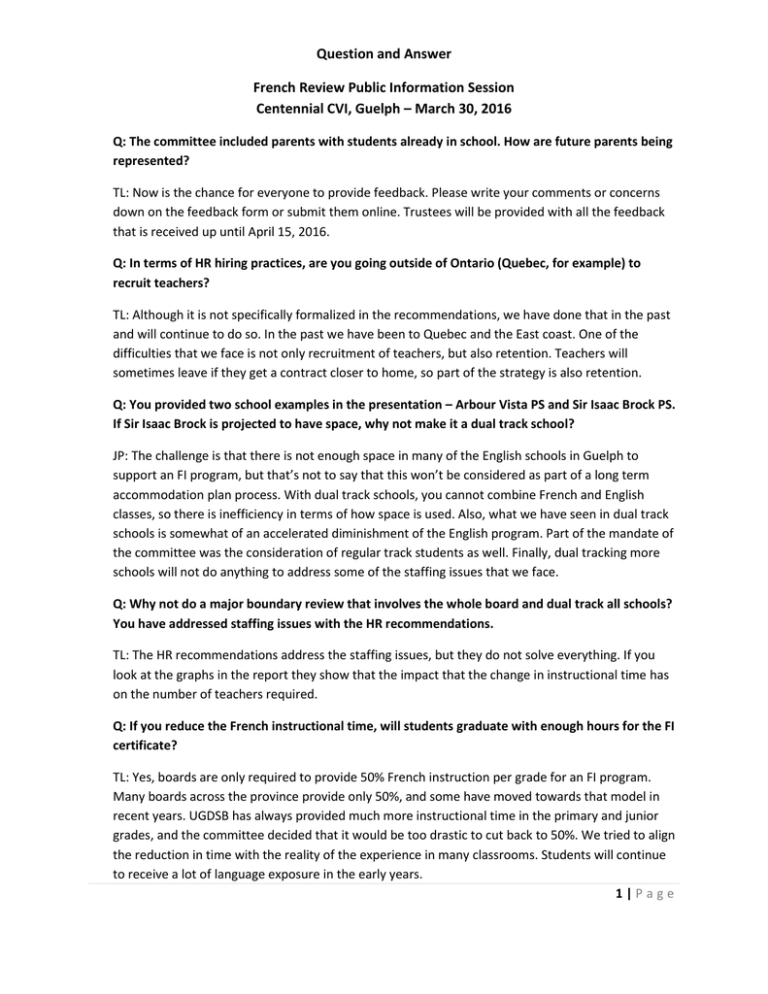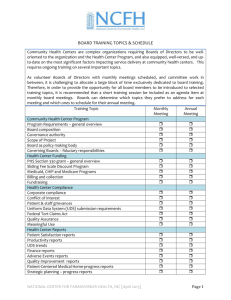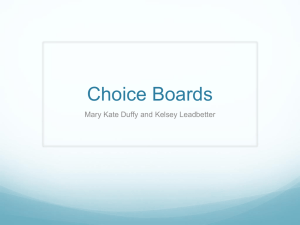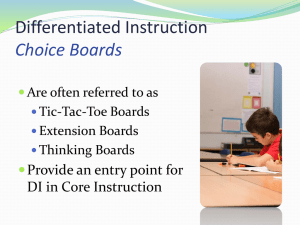Question and Answer French Review Public Information Session
advertisement

Question and Answer French Review Public Information Session Centennial CVI, Guelph – March 30, 2016 Q: The committee included parents with students already in school. How are future parents being represented? TL: Now is the chance for everyone to provide feedback. Please write your comments or concerns down on the feedback form or submit them online. Trustees will be provided with all the feedback that is received up until April 15, 2016. Q: In terms of HR hiring practices, are you going outside of Ontario (Quebec, for example) to recruit teachers? TL: Although it is not specifically formalized in the recommendations, we have done that in the past and will continue to do so. In the past we have been to Quebec and the East coast. One of the difficulties that we face is not only recruitment of teachers, but also retention. Teachers will sometimes leave if they get a contract closer to home, so part of the strategy is also retention. Q: You provided two school examples in the presentation – Arbour Vista PS and Sir Isaac Brock PS. If Sir Isaac Brock is projected to have space, why not make it a dual track school? JP: The challenge is that there is not enough space in many of the English schools in Guelph to support an FI program, but that’s not to say that this won’t be considered as part of a long term accommodation plan process. With dual track schools, you cannot combine French and English classes, so there is inefficiency in terms of how space is used. Also, what we have seen in dual track schools is somewhat of an accelerated diminishment of the English program. Part of the mandate of the committee was the consideration of regular track students as well. Finally, dual tracking more schools will not do anything to address some of the staffing issues that we face. Q: Why not do a major boundary review that involves the whole board and dual track all schools? You have addressed staffing issues with the HR recommendations. TL: The HR recommendations address the staffing issues, but they do not solve everything. If you look at the graphs in the report they show that the impact that the change in instructional time has on the number of teachers required. Q: If you reduce the French instructional time, will students graduate with enough hours for the FI certificate? TL: Yes, boards are only required to provide 50% French instruction per grade for an FI program. Many boards across the province provide only 50%, and some have moved towards that model in recent years. UGDSB has always provided much more instructional time in the primary and junior grades, and the committee decided that it would be too drastic to cut back to 50%. We tried to align the reduction in time with the reality of the experience in many classrooms. Students will continue to receive a lot of language exposure in the early years. 1|Page Question and Answer French Review Public Information Session Centennial CVI, Guelph – March 30, 2016 Q: In terms of recruitment, are you doing anything beyond connecting with teachers colleges to try to encourage other students to go into the profession? Right now, many people are deterred from teaching because they feel there are no jobs. TL: Part of the 3 year FSL plan is improving the retention of both core and FI students. We want to encourage students to continue with their French education and then hopefully they will consider continuing with it in their post-secondary education as well. Q: Hiring is complicated, particularly for LTO positions. How are you addressing this? TL: There is a Ministry regulation which directs some aspects of the hiring process. As it stands, if someone is qualified to teach French, they have a much better chance of getting a contract right away compared to new English teachers. Q: Urban centres are growing and in Guelph new building is happening all the time and the population will increase. Do you expect to have a lot of vacant space in regular track schools in the future? JP: We know where the growth is projected to occur and we have built that into our projections. We also know that participation rates are increasing and have built in trends that we are experiencing at different schools. Q: In terms of quality of instruction, we can assume that there will be a lot of teachers retiring in the coming years so there will be a lot of new teachers coming in. Is quality an issue in both regular track and FI? TL: Right now, the quality piece is more related to FI, not regular track. Quality is not just about teachers, it’s about the quality of instruction and program as a whole. C: You should put more resources into this program to make UGDSB a French hub. Go all over the world to get teachers. Q: How much weight is actually given to the concerns being voiced tonight? TL: Trustees take feedback very seriously. They directed staff to host these public meetings so that they could hear from the community prior to making a decision. All feedback received up to April 15 will be compiled and given to trustees for review. All trustees are present at the meeting tonight. Q: In terms of instructional time, if you are saying that 100% French instruction is not consistently being achieved, will you be able to achieve the proposed 84%? TL: When the committee reviewed the instructional time, they landed on 84% French instruction because they felt it best reflected the reality of many classrooms. The 16% represents one block of 2|Page Question and Answer French Review Public Information Session Centennial CVI, Guelph – March 30, 2016 planning time. The idea is that you provide that planning time block in English (i.e.: Phys. Ed) in order to better manage staffing. In grades 3-5, students would have the equivalent of two planning time blocks in English. Grades 6-8 would have 50% French instruction. Grades 7-8 has always had 50% French instruction, so there has been no change there. Q: A drop to 50% French instruction is more concerning. This is one of the best boards in terms of the amount of French taught and the proximity of FI schools. Do you know what the graduation rate is for boards that provide only 50% instruction across the grades? TL: Part of the committee’s work was to canvas other boards in the province about their French programs. We also had representatives from other boards come speak to the committee about their experience. The committee ultimately decided not to move to 50% French instruction because it was such a drastic change from our current model. Q: When will the change in instructional time come into effect? TL: That is one of the recommendations that have not yet been approved. If Trustees approve the change in instructional time, it would come into effect September 2017, the same time as the proposed enrolment cap. Q: What can you do to increase interest in regular track? Does regular track have better educational outcomes and better quality of teachers? TL: No, we are not saying that. It comes down to parent choice, but we don’t want to overlook the regular track program in favour of FI. We have included a recommendation related to earlier core French instruction. Q: How come the survey that was sent out in the fall did not address caps or changes in instructional time? Only the 8 parents on the committee had input on the cap recommendation. TL: They were not included in the survey because we did not have those recommendations at that time. The task of the committee was to come up with recommendations for the Trustees. We are looking for your feedback now. Q: I am a French teacher at another board and want to enrolment my child at UGDSB. The board is doing a good job. If you are exploring the idea of starting core French in grade 1, that would require more French teachers. Would that not take away from the pool of FI teachers and create a conflict? TL: Yes, it would create somewhat of a conflict but the idea is to provide more choice for parents. We do not receive funding for additional core French instruction, so it was included as a 3|Page Question and Answer French Review Public Information Session Centennial CVI, Guelph – March 30, 2016 recommendation that the Ministry look at FSL province-wide and see if there is an appetite to expand. Q: I am a teacher and a parent. It seems that the biggest issue is that there are not enough teachers to meet demand. I know of five experienced French teachers who live in Guelph and commute to other boards. They would love to work in the community that they live, but they are scared to lose their permanent position. What can I tell these people? TL: Tell them to apply! We do pull both English and French teachers from other boards. There is still the issue of seniority and Ministry regulation. Generally speaking, if we need to let people go due to reorganization they usually are not French teachers. Q: You approved recommendations related to recruitment and hiring. Why not give it time to see how those strategies play out before instituting the cap? TL: The issue is multi-faceted, and we still need to deal with the accommodation challenges. We are recommending that the cap be reviewed again in 2019, and then every five years thereafter. Q: How many boards have already implemented caps? Of those boards, how many give preference to students with siblings already in the FI program? Many boards limit enrolment in their FI programs, but each board administers this differently. Some boards use a lottery system to assign placement in the program, whereas other operate on a firstcome, first-served basis. Of the boards that manage FI enrolment, about half give preference to siblings of current FI students. Please refer to the chart on the following page for more information. 4|Page Question and Answer French Review Public Information Session Centennial CVI, Guelph – March 30, 2016 Board Dufferin Peel Catholic DSB Lottery Y Durham Catholic DSB Grand Erie DSB Sibling Preference Y* Y Y Halton Catholic DSB Niagara Catholic DSB Peel DSB Y Y Y Simcoe County DSB Toronto DSB Y Waterloo Catholic DSB Y Y Waterloo Region DSB Y Y York Catholic DSB Y Comments Max 2 classes per site, no preference for siblings Placement in program guaranteed, but location is not. *Preference first given to neighbourhood students, then out of boundary students with child care arrangements, and then out of boundary students with siblings in program. Late registrants, first-come, firstserved. Cap begins 2016, siblings of current FI students guaranteed placement Early FI pilot, max 2 classes per site. First come, first served. No preference given to siblings of current FI students Online registration, applications time-stamped, firstcome, first-served. Siblings of current FI students provided first opportunity to register. Cap at 25% total Grade 1 enrolment. Guaranteed spot for siblings of current (2015/16) grades 4 to 7 FI students. 2016/17 entry is capped, online registration, applications processed in order they are received, application required for each child Online registration, placement in program guaranteed for on-time applicants, but school location not guaranteed, placement determined by home address Preference given to siblings of current FI students Any school may offer FI if there is enough interest, preference given to neighbourhood students and siblings of current FI students Lottery at each FI site if number of applications exceed available spaces DISCLAIMER - Every effort was made to ensure the accuracy of this information, however this list may not be exhaustive and is subject to change. 5|Page





